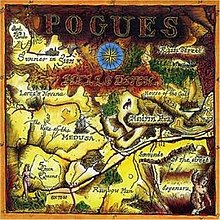Hell's Ditch
| Hell's Ditch | ||||
|---|---|---|---|---|
 |
||||
| Studio album by The Pogues | ||||
| Released | 6 November 1990 | |||
| Genre | Celtic rock, folk rock | |||
| Length | 41:24 | |||
| Label | Island | |||
| Producer | Joe Strummer | |||
| The Pogues chronology | ||||
|
||||
| Professional ratings | |
|---|---|
| Review scores | |
| Source | Rating |
| Allmusic | |
Hell's Ditch is the fifth full-length album by The Pogues, and the last to feature frontman Shane MacGowan as a member. It was released in 1990. It continued the group's slow departure from Irish music, giving more emphasis to rock and straight folk rock, and forsaking their earlier staples of traditional compositions almost entirely. MacGowan parted with the band after the release of the album, owing to the decline of his reliability as a performer, which was caused by his abuse of alcohol and drugs.
Several of the songs on the album have Asian themes, in sound or in content, notably "Summer in Siam", "The House of Gods" and "Sayonara"—although only the latter has a noticeably far-eastern tune. The song "Lorca's Novena" draws on MacGowan's affinity for Spain (particularly Almería, which he had discovered years earlier when filming Straight to Hell), and the famous Spanish poet Federico García Lorca. It tells of the poet's murder by Francisco Franco's Nationalist supporters in the Spanish Civil War, and how his body, never having been recovered, was said to have walked away. "The Wake of the Medusa" is a first-person narrative inspired by Théodore Géricault's painting "The Raft of the Medusa", which had appeared on the cover of the band's second album, Rum, Sodomy, and the Lash. The title track is based largely on the life and writings of French author and playwright Jean Genet, in particular The Miracle of the Rose and Our Lady of the Flowers, with its vulgar description of squalid prison life.
...
Wikipedia
